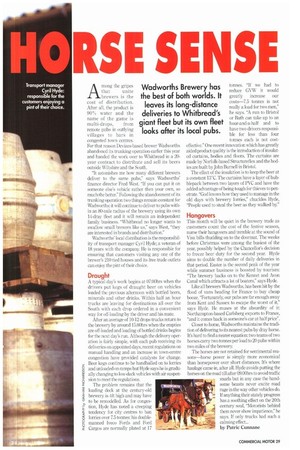115 NS
Page 31

If you've noticed an error in this article please click here to report it so we can fix it.
Arnong the gripes
that unite brewers is the cost of distribution. After all, the product is 90% water and the name of the game is multi-drops, from remote pubs in outlying villages to bars in congested town centres. For that reason Devizes-based brewer Wadworths abandoned its thinking operation earlier this year and handed the work over to Whitbread in a 20year contract to distribute and sell its beers outside Wiltshire and the South.
"It astonishes me how many different brewers deliver to the same pubs," says Wadworths' finance director Fred West. "If you can put it on someone else's vehicle rather then your own, so much the better." Following the abandonment of its trunking operation two things remain constant for Wadworths: it will continue to deliver to pubs within an 80-mile radius of the brewery using its own 14-dray fleet and it will remain an independent family business. "Whitbread no longer wants to swallow small brewers like us," says West, "they are interested in brands and distribution."
Wadworths' local distribution is the responsibility of transport manager Cyril Hyde; a veteran of 18 years with the company. He is responsible for ensuring that customers visiting any one of the brewer's 210 tied houses and its free trade outlets can enjoy the pint of their choice.
Draught
A typical day's work begins at 07:00hrs when the drivers put kegs of draught beer on vehicles loaded the previous afternoon with bottled beers, minerals and other drinks. Within half an hour trucks are leaving for destinations all over the South with each drop ordered in a convenient way for off-loading by the driver and his mate.
After an average of 10-12 drops trucks return to the brewery by around 1 5.00hrs when the empties are off-loaded and loading of bottled drinks begins for the next day's run. Although the delivery operation is fairly simple, with each pub receiving its deliveries on appointed days, recent regulations on manual handling and an ino-ease in town-centre congestion have provided catalysts for change. Beer kegs continue to be handballed on to lorries and unloaded on ramps but Hyde says he is gradually changing to low-deck vehicles with air suspension to meet the regulations,
The problem remains that the loading deck at the century-old brewery is 4ft high and may have to be remodelled. As for congestion, Hyde has noted a creeping tendency for city centres to ban lorries over 7.5 tonnes: his doublemanned lveco Fords and Ford Cargos are normally plated at 17
tonnes,. "If we had to reduce GNIVI it would greatly increase our costs-7.5 tonnes is not really a load for two men," he says. "A run to Bristol or Bath can take up to an hour-and-a-half and to have two drivers responsible for less than four tonnes each is not costeffective." One recent innovation which has greatly aided product quality is the introduction of insulated curtains, bodies and floors. The curtains are made by Norfolk-based Structureflex and the bodies are built by John Burnell in Bristol.
The effect of the insulation is to keep the beer at a constant 13'C. The curtains have a layer of bubblepack between two layers of PVC and have the added advantage of being tough for thieves to penetrate. "God knows how they used to manage in the old clays with brewery lorries," chuckles Hyde, "People used to steal the beer as they walked by."
Hangovers
This month will be quiet in the brewery trade as customers count the cost of the festive season, nurse their hangovers and tremble at the sound of Visa bills thudding on to the doormat. The weeks before Christmas were among the busiest of the year, possibly helped by the Chancellor's decision to freeze beer duty for the second year. Hyde aims to double the number of daily deliveries in that period. Easter is the second peak of the year while summer business is boosted by tourism: "The brewery backs on to the Kennet and Avon Canal which attracts a lot of boaters," says Hyde.
Like all brewers Wadworths, has been hit by the flood of vans heading for France to buy cheap booze. "Fortunately, our pubs are far enough away from Kent and Sussex to escape the worst of it," says Hyde. He muses at the absurdity of it: Northampton-based Carlsberg exports to France, "and it comes back in someone's car at half price".
Closer to home, Wadworths maintains the tradition of delivering to its nearest pubs by dray horse. It's hard to find a neater equation: two teams of two horses carry two tonnes per load to 20 pubs within two miles of the brewery'.
The horses are not retained for sentimental reasons—horse power is simply more economical than horsepower over short distances. It's where haulage'came in, after all. Hyde avoids putting the horses on the road till after 09.00hrs to avoid traffic snarls but in any case the handsome beasts never excite road rage in the way other vehicles do. If anything their stately progress has a soothing effect on the 20th century soul, "Motorists behind them never show impatience," he says. If only trucks had such a calming effect..
by Patric Curmane
















































































